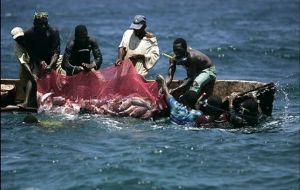MercoPress. South Atlantic News Agency
World Seafood Industry Employs 45 Million and 500 Million Live from Fish Income
 Poor fishermen have difficulties in reaching markets because of tough new rules
Poor fishermen have difficulties in reaching markets because of tough new rules New regulations, such as retailers’ requirement that fish must be certified as sustainable, and the impact of the global economic crisis are affecting the seafood industry, especially producers in developing nations, according to the United Nations Food and Agriculture Organization FAO.
Half of all fish imported by rich nations, valued at 43 billion USD annually, comes from the developing world, and the industry directly employs 45 million people, while approximately half a billion people rely on fish for some or all of their incomes. But for poorer nations, getting their fish to market is becoming increasingly difficult, FAO noted.
As of the start of this year, the European Union, the world’s largest import market for fish, requires that all imports of wild fish come with a certificate validated by the fisheries authorities of the country flagging the vessel that originally caught them. Through this new regulation, which other major markets are contemplating putting into place, the EU is hoping to combat illegal, unregulated and unreported fishing, but compliance is placing burdens on exporters.
Also, growing numbers of retailers, such as Trader Joe’s in the United States, will only carry fish certified as coming from a sustainable fishery, further raising the compliance bar. Such regulations mean that small-scale producers must acquire the technical know-how, familiarize themselves with best practices, invest in upgrading equipment and learn the new paperwork and procedures.
Compounding this is the global economic downturn, which resulted in a drop in imports in almost all fish markets last year, FAO pointed out, with estimates for 2009 showing a drop in value from 2008, when exports were valued at over 100 billion.
For its part, the agency’s Subcommittee on Fish Trade, set up in 1985, seeks to bring together both importing and exporting countries to find ways to “create an enabling environment for the sector to develop while successfully addressing the challenges that development presents,” said Ichiro Nomura, FAO Assistant Director-General for Fisheries and Aquaculture.
“Market access requirements can be shaped to create incentives to achieve sustainable fisheries,” he stressed, calling on policy-makers to ensure that such measures are “sound, science-based, transparent and do not create unnecessary barriers.”
The agency has long called for good management of fisheries by developing nations if they are to continue operating in the long-run, as increased demand for fish can potentially lead to over-exploitation and wasteful use of stocks.




Top Comments
Disclaimer & comment rulesCommenting for this story is now closed.
If you have a Facebook account, become a fan and comment on our Facebook Page!